International Security is America's leading peer-reviewed journal of security affairs.
Abstract
The Cold War ended more than a decade ago, but the debate on the demise of the U.S.-Soviet rivalry continues. Robert English of the University of Southern California critiques Stephen Brooks and William Wohlforth’s recent article, “Power, Globalization, and the End of the Cold War.” English faults the authors for privileging materialist explanations for the end of the Cold War and the collapse of the Soviet Union to the exclusion of other possible causes—in particular, the influence of “new thinkers” led by Mikhail Gorbachev. After correcting what Brooks and Wohlforth state is English’s “misunderstanding of [their] research design,” the authors elaborate their article’s contribution on “how to assess the causal implications of widely accepted findings” and the significance of this practice for qualitative research.
Brooks, Stephen G. and William Wohlforth. “From Old Thinking to New Thinking in Qualitative Research.” Spring 2002
The full text of this publication is available in the link below.





